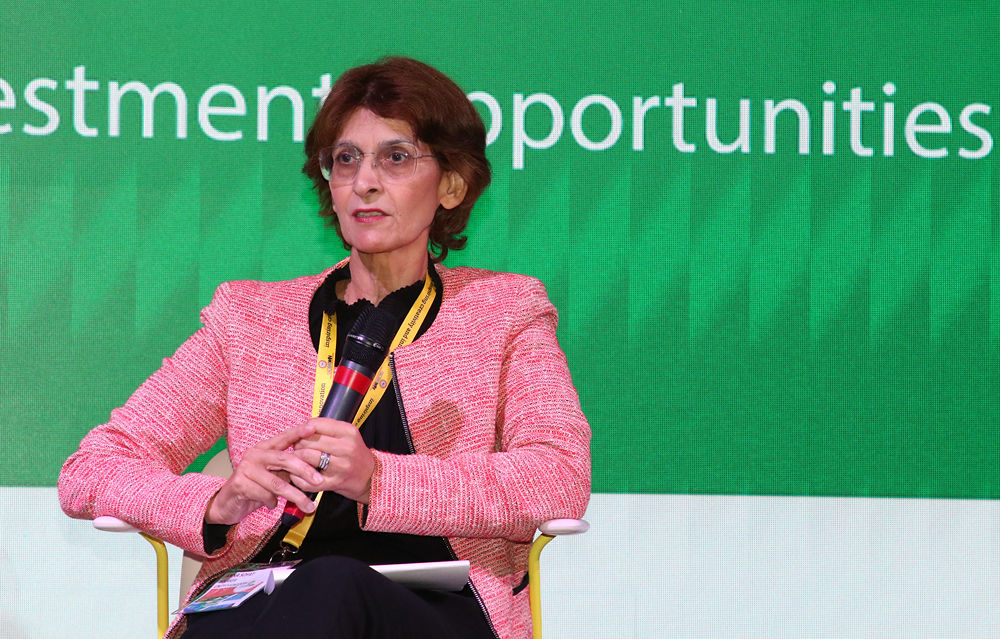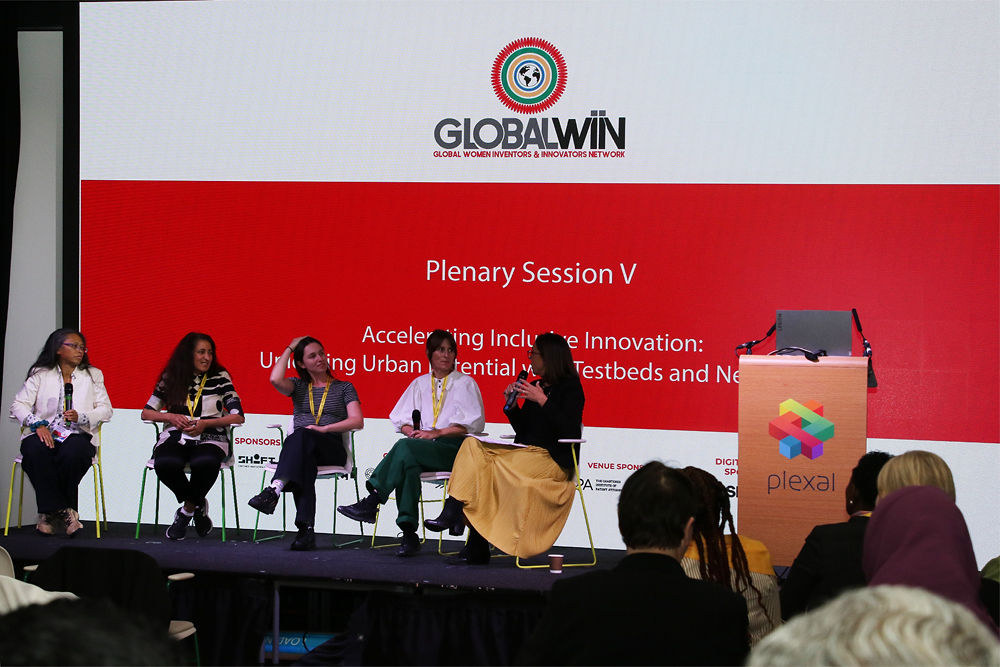Our Stratford workspace proudly hosted the two-day Global Women Inventors & Innovators Network (Global WIIN) Conference, bringing together women from around the world to celebrate innovation, inclusivity and sustainability.
GlobalWIIN, an internationally focused community based in the UK, is dedicated to empowering women in science, technology and innovation. It provides a platform for women to showcase their inventions and offers resources, networking opportunities and advocacy to help address the gender gap in these fields.
The event began with an introduction from GlobalWIIN founder and CEO Bola Olabisi inspiring us with her powerful words: “We are here to celebrate women who against all odds, have advanced innovations and inventions to where they are today.”
At Plexal, we’re deeply committed to embedding equality into the heart of innovation. Kate Pearman, COO at Plexal, emphasised in her opening remarks: “Like you, I deeply understand the crucial role that female leadership plays in driving change, fostering creativity and ensuring business success.“
Kate went on to highlight the compelling data that shows organisations with greater diversity – more women in teams, leadership roles, and on boards – consistently outperform their less diverse counterparts. However, she also stressed that the motivation to build inclusive workplaces should go beyond financial gains. “True equality must be embedded in company culture,” she stated. Recognising that Plexal leads by example with a gender-balanced workforce whilst also providing ample opportunities for growth, Kate assured the inventors and innovators joining us can be confident they’re in the perfect place to see their ambitions recognised.
The opening concluded with a powerful address from Howard Dawber, Deputy Mayor of London for Business and Growth, who reminded us of the vital role woman-led businesses play in London’s economy. Although women represent 20% of new entrepreneurs, they receive only around 2% of total venture capital funding. The figures are even lower for Black, Asian, and minority ethnic women founders. He remarked: “Only by harnessing all of the talents in London will we have a truly inclusive and sustainable economy.”
Over the course of day one, speakers took to the stage to discuss their journeys and strategies for overcoming challenges in leadership, innovation and technology. It brought together experts from diverse fields, focusing on topics such as women’s empowerment in finance, disruptive tech for sustainable development and accelerating inclusive innovation.
Key moments included a discussion regarding disruptive technology – highlighting that the term disruptive shouldn’t instill fear but instead should be viewed as an opportunity for growth and innovation. One example highlighted – the mobile phone, once seen as “disruptive,” is now a universal tool that demonstrates how technology, if embraced, can enhance lives. Change is often met with resistance, but innovation can drive societal progress. By teaching children and young adults that technology is a tool for creativity and problem-solving, society can better adapt to technological advancements.

Financial expert Anna Sofat addressed the important topic of women and wealth. Anna began by highlighting that the finance industry was historically designed with the male in mind therefore discouraging women to engage in wealth creation. However, times have changed – it is projected that women will soon control half of the world’s wealth. Therefore, it is important for women to take ownership of their financial knowledge. Anna made the point that, as women, we often play a central role in managing household finances, demonstrating a strong involvement in budgeting and financial decision-making. Despite this, there’s still this “belief” that women are less educated in numbers, even though we handle these responsibilities daily. It’s important not to delegate financial knowledge to others but rather to become financially literate to unlock opportunities to build wealth and achieve success over the long term. Anna emphasised that it is important to learn the fundamentals like P&Ls and balance sheets, rather than solely focusing on cash management, as this is crucial for business growth and the information banks and investors seek.

The Accelerating inclusive innovation: Unlocking urban potential with testbeds and networks discussion saw SHIFT’s Head of Innovation Francesca Colloca, ask the question to a panel of experts from SHIFT London: “When you hear the term inclusive innovation, what does that mean?”
Sophie Rochester, Founder of Yodomo, discussed how traditional innovation often revolves around questions such as: “What problem are you solving, and how will you monetize it?” In contrast, inclusive innovation encourages us to think differently. Within the context of a circular economy, innovation need not focus solely on rapid growth or profit; it’s about securing funding for sustainable projects that prioritizes long-term impact over exponential growth.
Josephine Bromely, COO & Co-founder of MapMorta, offered: “Inclusive innovation has to be inherent innovation.” Different ideas and perspectives are essential to producing the best innovation. Her background in software technology, combined with her startup’s focus on the built environment, demonstrates how mixing diverse backgrounds led them to create the software they have today.
Rose Carter, Co-founder and CEO at Aeturnum, opined: “Inclusive innovation is elastic innovation”’– by which she meant it closes the gaps by bringing together people with different mindsets, cultures, and backgrounds who can all contribute to your innovation.
Rokiah Yaman, MD at MAD Leap CIC, shared that their company engages with inclusive innovation by actively engaging with diverse communities and ensuring that their voices are heard in the innovation process such as working with social housing estates and schools in underprivileged areas.
Inclusive innovation redefines traditional approaches by prioritizing sustainability, diverse perspectives, and long-term impact over mere profitability. By integrating varied backgrounds and ideas, inclusive innovation can effectively address urban challenges and foster meaningful change.


